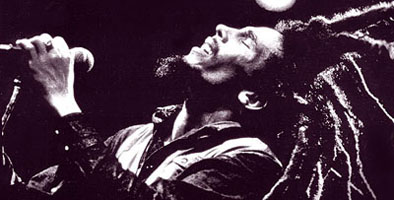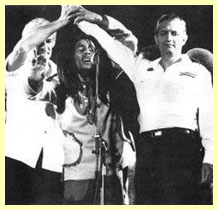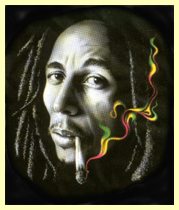
Music raises the soul of man even higher than the so-called external form of religion…That is why in ancient times the greatest prophets were great musicians. – Hazrat Inayat Khan, (The Mysticism of Sound and Music)
 Bob Marley’s music represented a symbol of hope and optimism for members of the black community in their fight against oppression and corruption. Through his music, Marley addressed many issues of oppression that occurred, seeking to point out the many disadvantages that were placed upon blacks in attempt to spring an uprising that would allow blacks to speak out, and not be subjugated to white authority. Marley’s music was looked upon as the voice for blacks, which sought to reveal the shortcomings of blacks that were influenced and contrived through politics. Marley was often looked at as a radical political leader, but his political stance stemmed from love, which he saw as an “unshakeable knowledge of the oneness of humankind”. Freedom from oppression was the overwhelming message sent throughout Marley’s music in attempt to restore African culture and rejuvenate the black community.
Bob Marley’s music represented a symbol of hope and optimism for members of the black community in their fight against oppression and corruption. Through his music, Marley addressed many issues of oppression that occurred, seeking to point out the many disadvantages that were placed upon blacks in attempt to spring an uprising that would allow blacks to speak out, and not be subjugated to white authority. Marley’s music was looked upon as the voice for blacks, which sought to reveal the shortcomings of blacks that were influenced and contrived through politics. Marley was often looked at as a radical political leader, but his political stance stemmed from love, which he saw as an “unshakeable knowledge of the oneness of humankind”. Freedom from oppression was the overwhelming message sent throughout Marley’s music in attempt to restore African culture and rejuvenate the black community.
 Marley’s music was driven by the political atmosphere of Jamaica, stemming from oppression and discrimination. Through his lyrics, Marley sought to challenge politics and the treatment of blacks hoping to spark a revolution. “Get Up, Stand Up”, was a song in which Marley demonstrated the demand for change amongst the black community in Jamaica. This song challenged oppression, in attempt to rally blacks in their fight for equality. Lyrics such as, “and now you’ve seen the light, stand up for your rights”, expressed the eagerness in which Marley wanted members of the black community to achieve a political voice in a society that was not ready to accept blacks as equals. “One Love People Get Ready” was another popular song by Marley that expressed the need for social progress in which there is unity amongst society. This song was his “plead to mankind” in efforts to unite a country that was racially isolated.
Marley’s music was driven by the political atmosphere of Jamaica, stemming from oppression and discrimination. Through his lyrics, Marley sought to challenge politics and the treatment of blacks hoping to spark a revolution. “Get Up, Stand Up”, was a song in which Marley demonstrated the demand for change amongst the black community in Jamaica. This song challenged oppression, in attempt to rally blacks in their fight for equality. Lyrics such as, “and now you’ve seen the light, stand up for your rights”, expressed the eagerness in which Marley wanted members of the black community to achieve a political voice in a society that was not ready to accept blacks as equals. “One Love People Get Ready” was another popular song by Marley that expressed the need for social progress in which there is unity amongst society. This song was his “plead to mankind” in efforts to unite a country that was racially isolated.
Bob Marley didn’t just sing about the social issues but much of his music also derived from his Rastafarian faith. The true foundation of Rastafarianism is the Holy Piby also known as the Black Man’s Bible written by Robert Rogers. Rastafarians believe the Messiah is Haile Selassie who was actually called “Ras Tafari” the emperor of Ethiopia from 1930 to 1974. Rastafarians considered Selassie the living God from Marcus Garvey’s prophecy. Rastas believed that it was Haile Selassie that would lead them and create a perfect world for them called Zion.  Haile Selassie passed away on August 27, 1975 but because no burial site was ever found many Rastas still believe he is alive.
Haile Selassie passed away on August 27, 1975 but because no burial site was ever found many Rastas still believe he is alive.
Bob Marley followed the Rastafarian way of life. Rastafarians’ had to refrain from most meat but mostly pork, shellfish, snails and any predatory and scavenger marine life. They refrained from alcohol as well. One of Bob Marley’s trademarks were his dreadlocks. This appearance was also because of Rastafarianism because the combing and cutting of hair was forbidden in the bible. Another important symbol of the Rastafarian way of life is Ganja (marijuana). Rastafarians consider smoking the "Holy Herb" to being filled with the Holy Spirit. Many rastafarians were harassed because of their appearance and Ganja smoking. Bob Marley’s song “Rebel Music” was about police harassment of Rastafarians. Other religious works are songs such as the "Redemption Song" and "Forever Loving Jah." Through his music Bob Marley allowed blacks to trace back to their homeland through sources of African cultural pride, identification, and resistance. In the end, making him one of the most recognizable icons of the African Diaspora.

